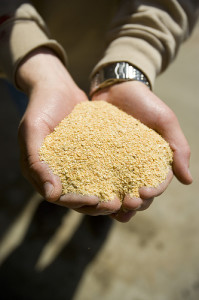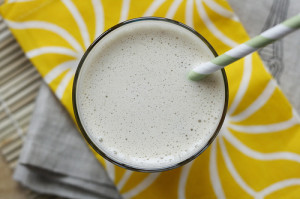
The soybean has been a staple food in Asia for centuries and has slowly made it’s way into western diets. At first soy was made popular due to its use in faux meat products and in Asian cuisine that included tofu. As people become more aware of this powerful little legume, the production and use of soy in the US has sky-rocketed.
It can be eaten either tender or its dried form. It can also be had either as soya nugget chunks or it can be processed and served inform of vegan protein powders or shakes. Studies have shown that it does offer some cardiovascular benefits to its users. Over the years it has also been noted that eating soy may help reduce or lower the risk of some types of cancer like breast and prostrate.
Why Soy Makes a Great Vegan Protein Supplement
The main reason soy has been turned into a vegan protein powder is because of it’s nutritional benefits. Due to the natural mineral make-up of the soybean, many professional agencies consider the soybean to be a complete protein. A complete protein has just the right amount of essential amino acids that the human body needs, in perfect proportions.
Soy protein powder has the amino acid and protein make up equivalent of eggs, meat, and poultry. If you want to get technical, soy protein has been scored a 74 according to the Protein Digestibility Corrected Amino Acid Score (PDCAAS), the gold standards for measuring quality of proteins.
One of the leading benefits is its ability to provide lots of nutrients at a go. It has over 20 essential minerals and vitamins in every serving. The numerous ingredients used to make the protein powder do make it not only nutritious, but healthy too.
What to Expect from a Soy Protein Powder

In most instances, soy protein powder comes packed in a sealed container or package and is usually has several ingredients therein. Some of the ingredients that are used in making this wonderful product include the following;
- Soy protein isolate
- Thiamin
- Folic Acid
- Calcium
- Biotin
- Iron
- Calcium
- Phosphorous
- Magnesium
- Zinc
- Copper
- Manganese
- Sodium
- Potassium
- Xylitol
The above ingredients are not exclusive and may vary from one manufacturer to the other depending on the brand and flavor of choice. The variance can be in terms of amount of the above ingredients provided or by the actual ingredients used. The most common constituent nevertheless in all soy protein powder is the soy protein isolate which provides much of the protein and forms a major ingredient in almost all brands.
Due to its versatility, soy can either be preserved for a certain period or used immediately; it does not lose its nutrient value, especially the protein content that it contains. This is not diminished by storage or proper processing.
Benefits of Soy Protein Powder
It is worth noting that the protein powder is usually quite low in fat. There are also brands that produce soy protein powder free of carbohydrates and thereby, low in calories but rich in proteins. Low fat, high in protein content makes this a superior source of protein for vegetarians.
The soybean is extremely versatile and can be included in many ways into anyone’s diet and daily routines. From shakes to juices, soy protein can be used in endless vegan shake recipes and juices. Also, people who typically appreciate and use this supplement are vegetarians, vegans, and vegan body builders.
For best results, it is recommended that you mix at least 3 heaped tablespoons of the protein powder with one 8 oz cup with the beverage of choice then put the mixture in a shaker or electric blender; you can even add some fruits to give it a more a natural and tasty feel then blend till smooth.
